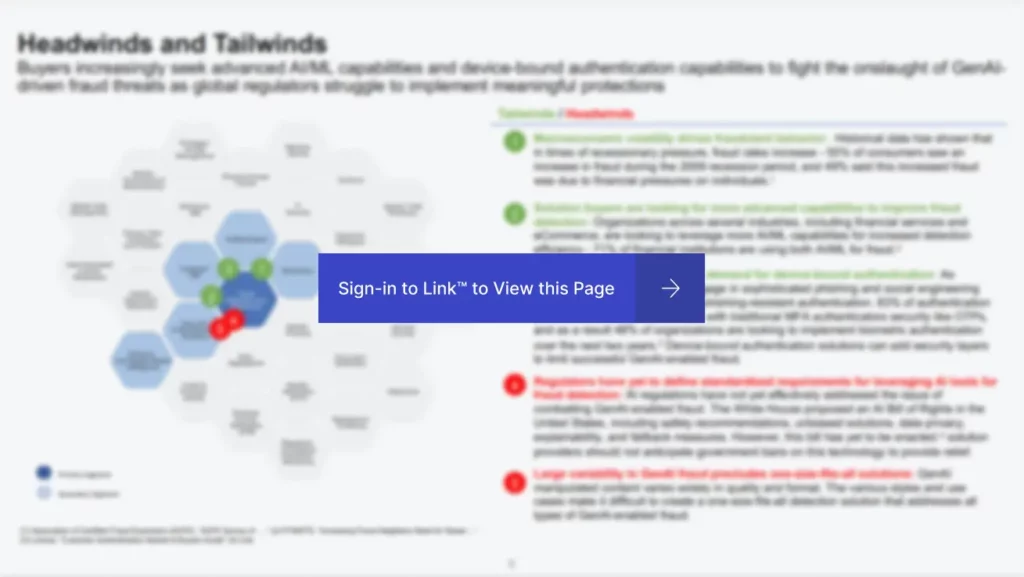Generative AI (GenAI) represents a significant technological frontier, impacting cybersecurity landscapes in two primary ways. Its advanced capabilities enable malicious actors to craft sophisticated and convincing fraudulent schemes, from phishing attacks to synthetic audio and video content designed to deceive and exploit. Conversely, GenAI also powers robust fraud detection systems, generating synthetic data that mimics complex fraud scenarios and enhances organizational capabilities to identify and neutralize threats proactively. As businesses navigate the duality of GenAI, advancing cybersecurity measures and regulatory frameworks to harness its potential for good while mitigating risks is crucial.

The widespread availability and affordability of GenAI tools, combined with global macroeconomic instability, are key drivers behind the significant increase in the volume and velocity of fraud attacks targeting consumers and businesses. The rapid adoption of tools like ChatGPT and FraudGPT, accessible relatively cheaply, has facilitated their use in malicious activities such as creating malware and phishing attacks. This surge in fraudulent activities is further exacerbated by economic downturns, which increase financial pressures and lead to cuts in fraud detection resources within organizations. Recent statistics show a drastic increase in phishing incidents and overall fraud complaints, highlighting the growing challenge of GenAI-enabled fraud in an economically unstable environment.
Insights into the Impact of Generative AI and Related Fraud Attacks
- ChatGPT adoption surpassed 1 million users within 5 days of its launch, now boasting approximately 100 million weekly active users.
- One-third of cybersecurity experts identified the increase in attack volume and velocity as a top GenAI-related threat.
- Malicious emails and credential phishing volumes have increased more than 12-fold and nearly tenfold in the past 18 months.
- Fraud complaints rose from 847,000 in 2021 to 1.1 million in 2022, escalating total losses from $4.2 billion to $10.5 billion.
- FraudGPT, a GenAI tool capable of generating malicious code and designing phishing pages, is available for as low as $90 monthly.
- 93% of financial institutions plan to invest in AI for fraud prevention in the next 2-5 years
GenAI Market Trends and Challenges
GenAI’s dual nature significantly influences cybersecurity, with fraudsters using it to enhance their fraudulent schemes, including phishing and social engineering, by creating more convincing and sophisticated attacks. Tools like FraudGPT can write malicious code, generate malware, and create phishing pages, dramatically increasing phishing activities.
Solution providers are also adopting GenAI to strengthen defenses against such threats. Its ability to generate synthetic datasets allows for better training and improvement of risk and decision models, as evidenced by the growing demand among financial institutions planning substantial investments in AI for fraud prevention.
Despite its growing adoption, GenAI faces challenges like the unpredictable nature of new disruptive technologies, accessibility issues, a lack of regulatory oversight, and insufficient education and awareness about its capabilities and risks. These factors complicate the management of GenAI’s impact on fraud detection and prevention.
Strategies for Strengthening Defenses Against GenAI-driven Fraud
To effectively combat GenAI-driven fraud, businesses can adopt advanced AI and ML technologies for anomaly detection, implement device-bound authentication for added security, utilize multi-factor authentication to verify user identities, and apply behavioral analytics to monitor unusual activity. Continuous monitoring and regular updates of security measures are also essential to keep pace with evolving fraud tactics, ensuring robust protection even as regulations develop. Customers and members can access Liminal’s research in Link for detailed information on the headwinds and tailwinds shaping effective responses to these threats. New customers can sign up for a free account to view this report and access much more.

What is GenAI?
Generative AI (GenAI) is a type of artificial intelligence that can autonomously create new content such as audio, images, text, and videos. Unlike traditional AI, which follows strict rules or patterns for specific tasks, GenAI uses neural networks and deep learning to produce original content based on patterns in data it has learned. This capability is increasingly integrated into everyday applications. Still, it poses risks, such as enhancing the effectiveness of phishing and social engineering attacks by scammers exploiting GenAI to create convincingly fake communications.GenAI also offers tools for enhancing fraud prevention. It enables the creation of synthetic data samples that mimic real-life fraud scenarios, helping to train and improve fraud detection systems, thus preparing solution providers to better recognize and react to emerging fraudulent techniques.




